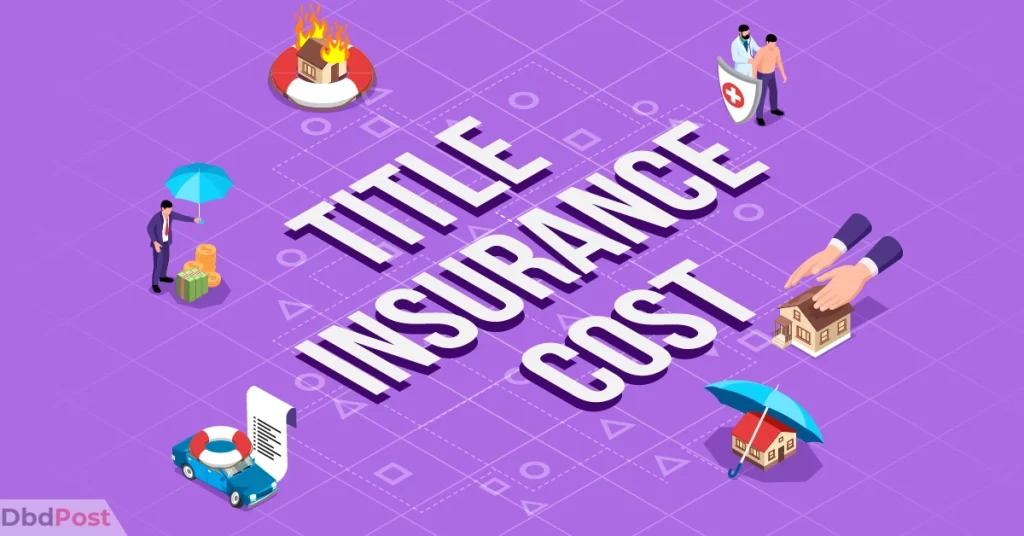Your home or property is a significant investment. If someone claims to own it, that could cause financial problems. Title insurance protects you from financial losses if there are property ownership issues.
Title insurance cost covers defending against legal claims. When buying a home, getting a lender’s title insurance usually costs 0.5 to 1 percent of the purchase price.
This guide explains title insurance’s importance for homebuyers. Likewise, it provides detailed information on its costs to help you make an informed decision and protect your rights to the property.
What is title insurance?

Title insurance is a type of insurance that protects homebuyers and lenders from financial loss caused by problems with the property’s title. It is a one-time cost paid when a real estate transaction is completed.
Title insurance aims to give homebuyers and lenders peace of mind and financial security against any unknown issues related to the property’s title.
How is title insurance cost determined?
The cost of title insurance is determined based on a percentage of the home’s purchase price. Typically, it ranges from 0.5% to 1% of the home’s price.
For example, if you bought a home for $359,000 (the national median price), you would spend around $1,795 to $3,590 on the lender’s title insurance.
As the homebuyer, you are responsible for covering this expense, usually included in your closing costs.
To calculate the cost of title insurance, the insurance company multiplies the home’s purchase price by a fixed rate per thousand dollars of the home’s value.
For instance, if the rate per thousand is 0.6% and the property is worth $300,000, the title insurance cost would be $1,800.
Here’s the calculation:
- $300,000 / $1,000 = 300
- 300 x $6 (rate per thousand) = $1,800
Different types of title insurance policies

The most common types of title insurance policies for real property are a lender’s and an owner’s policies. [1]California Department of Insurance, “ What is Title Insurance, … Continue reading
Lenders Title Insurance
When obtaining a home loan, a lender will require the borrower to purchase a lender’s title insurance policy to protect against potential losses if the seller cannot transfer title rights.
The policy covers only the lender up to the loan amount. While a lender’s policy is required, it does not protect the borrower from issues such as back taxes.
Owner Title Insurance
Getting an owner’s policy is a smart move if you buy a home. Owner’s title insurance will cover the purchase price of your home and any legal fees related to ownership issues that may arise after you purchase the property.
This policy will remain effective when you own a share of the property. While you are not obligated to purchase an owner’s policy, it is recommended to safeguard your financial interest in the property.
You may be able to get an enhanced owner’s policy for extra protection, but it could come with a higher cost.
Lenders Title Insurance
The lender’s policy solely safeguards the lender if any title or ownership issues emerge after the property purchase.
This policy reduces as you pay off the mortgage and eventually terminates upon complete payment.
This policy only benefits the lender, so obtaining an owner’s policy is suggested to protect your interests.
Factors that can impact title insurance cost

Several factors can affect the cost of title insurance. These include:
Property location
The cost of title insurance is influenced by where the property is situated.
Generally, areas with higher property values, property taxes, or a greater risk of title defects tend to have higher insurance costs.
Property value
The property’s value is an important factor in determining the rates for title insurance.
Typically, higher property values result in higher insurance costs.
Attorney fees
Some states mandate that an attorney review the title search and prepare the title insurance policy. This requirement can increase the overall cost of insurance.
However, in other states, an attorney is unnecessary, and the title insurance company handles all aspects, including the title search and policy preparation.
Title search fees
The cost of conducting a title search also affects the total cost of title insurance.
The title search is crucial in identifying any potential issues with the property’s title. The more comprehensive and time-consuming the title search, the higher the insurance cost.
Type of policy
The choice of title insurance policy can impact the cost. A lender’s policy is usually less expensive than an owner’s policy.
An owner’s policy provides broader coverage and is designed to safeguard the homeowner’s investment in the property, while a lender’s policy only protects the lender’s financial interest in the property.
Saving money on title insurance

Here are ways to save money on title insurance premiums:
- Compare quotes from different title insurance companies to find the best coverage at the best price.
- Negotiate any additional fees charged by the title insurance company, such as mailing, copying, search, certificate, premiums, or closing fees.
- Consider bundling your title insurance with other insurance policies you need.
- Check if your lender offers any discounts on closing costs when purchasing a new home or refinancing your current one.
Related Stories
- Get the inside scoop on how to update your signature in Outlook for a professional touch.
- Discover how to complain to Chipotle and have your concerns addressed – here.
- Find out how to complain to McDonalds and ensure your feedback is heard.
- Know everything about how to check your 401K balance online with our guide.
- Find out how to cancel shipment in Aramex with our guide.
FAQs
Do the costs of forming an LLC vary by state?
Yes, the cost to start a limited liability company varies by state. This is because of the various state filing fees that must be paid when forming an LLC.
Be sure to check your state’s specific requirements and associated LLC startup costs associated before proceeding with formation.
What are the ongoing fees associated with running an LLC?
The ongoing costs of running an LLC include registered agent fees, business licenses, and permit fees.
Other than that, publication fees, name registration fees, annual filing or reporting fees, and business license renewal fees are also associated with LLC.
Can I form an LLC on my own, or do I need to hire an attorney?
You do not have to hire an attorney to form an LLC, as it is not legally required. Register the business entity on your state’s secretary of state website and with the Internal Revenue Services (IRS).
How long does it take to form an LLC?
Setting up an LLC in each state takes different amounts of time. It usually takes from one week to 10 days. But in some states, you may get approval for your LLC in only three days.
Title insurance is a necessary risk management tool to protect you from losses associated with legal disputes over ownership rights.
Understanding title insurance costs and shopping for the best possible rates is essential.
- 107shares
- Facebook Messenger
About the author
DbdPost Staff is a team of writers and editors working hard to ensure that all information on our site is as accurate, comprehensive, and trustworthy as possible. Our goal is always to create the most comprehensive resource directly from experts for our readers on any topic.


![How Much Does it Cost to Wrap a Car in [year]? how much does it cost to wrap a car-feature image](https://dbdpost.com/wp-content/uploads/2021/09/how-much-does-it-cost-to-wrap-a-car-feature-image-150x150.jpg)
![How to Delete Shein Account? ([year] Edition) feature image-how to delete shein account](https://dbdpost.com/wp-content/uploads/2021/10/feature-image-how-to-delete-shein-account-150x150.png)
